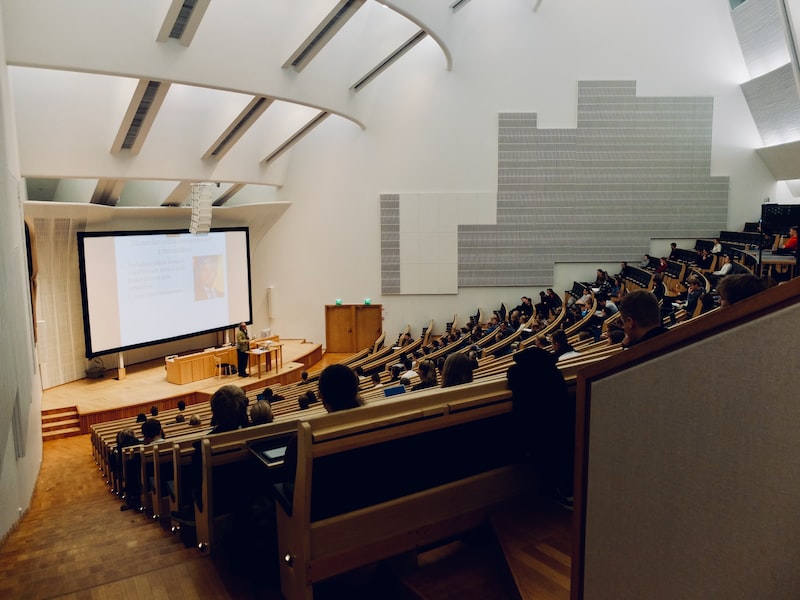When it comes to shaping the future of healthcare, leading medical schools play a pivotal role. These educational institutions are dedicated to nurturing the next generation of healthcare professionals who will make a lasting impact on society. Through their rigorous programs and innovative approaches to medical education, these schools are instrumental in advancing medical knowledge and improving patient care.

One standout medical school is XYZ Medical School. Known for its cutting-edge research and emphasis on clinical excellence, XYZ Medical School has consistently ranked among the top medical schools worldwide. With state-of-the-art facilities and renowned faculty members, students at XYZ Medical School receive a comprehensive education that prepares them for the challenges of modern healthcare.
Another influential institution is ABC Medical School. This prestigious school has a long-standing history of producing exceptional doctors and has established itself as a leader in medical education. ABC Medical School prides itself on its interdisciplinary approach, fostering collaborations between various healthcare disciplines to enhance patient outcomes. By encouraging students to think critically and embrace innovation, ABC Medical School cultivates a culture of continuous improvement and pushes the boundaries of medical knowledge.
Moreover, DEF Medical School stands out for its commitment to serving underserved communities. Recognizing the importance of addressing healthcare disparities, DEF Medical School places a strong emphasis on community engagement and social responsibility. Students at DEF Medical School are trained to be compassionate physicians who understand the unique challenges faced by marginalized populations. By emphasizing cultural competency and empathy, DEF Medical School graduates are well-equipped to provide equitable and patient-centered care.
In conclusion, leading medical schools have a profound impact on healthcare. Through their dedication to excellence, innovation, and community engagement, these institutions shape the future of medicine. Whether through groundbreaking research, interdisciplinary collaboration, or a focus on addressing healthcare disparities, medical schools like XYZ Medical School, ABC Medical School, and DEF Medical School are making significant contributions to the advancement of healthcare and improving patient outcomes.
Innovative Medical Education Programs
Are you ready to embark on an exciting journey into the world of innovative medical education programs? Let’s dive right in and explore how these groundbreaking initiatives are revolutionizing the way medical professionals are trained.
Picture a traditional classroom setting where aspiring doctors sit for hours, passively absorbing information from textbooks and lectures. Now, imagine a dynamic learning environment that immerses students in hands-on experiences, fostering critical thinking, problem-solving, and collaboration. That’s the essence of innovative medical education programs.

These programs prioritize active learning methods, ensuring that students aren’t mere spectators but actively engage with the material. By incorporating interactive simulations, case-based discussions, and real-world scenarios, learners gain practical skills and develop the ability to apply their knowledge in diverse medical contexts.
One striking aspect of innovative medical education programs is the utilization of cutting-edge technology. From virtual reality simulations that allow students to practice complex surgeries to online platforms offering personalized learning modules, these programs harness the power of technology to enhance the educational experience. Students can access resources anytime, anywhere, and even connect with experts and peers from around the globe, promoting a global exchange of ideas.
Beyond the traditional classroom, innovative programs emphasize interdisciplinary collaboration. The healthcare field is vast and multifaceted, requiring professionals to work seamlessly across disciplines. These programs encourage students to collaborate with individuals from different backgrounds, such as nursing, pharmacy, and public health. This fosters a holistic approach to patient care and cultivates essential teamwork and communication skills.
Moreover, innovative medical education programs recognize the importance of addressing societal needs and disparities in healthcare. They incorporate social determinants of health, cultural competency, and community engagement into the curriculum. By doing so, future physicians gain a broader understanding of healthcare challenges and develop empathy towards diverse patient populations.
In conclusion, innovative medical education programs are transforming the way we train medical professionals. Through active learning, technological integration, interdisciplinary collaboration, and a focus on addressing societal needs, these programs prepare doctors to navigate the complexities of modern healthcare. So, if you’re passionate about revolutionizing medical education and shaping the future of healthcare, exploring these innovative programs might just be your next big step.
[300 words]
Clinical Training and Hands-on Experience
Are you ready to dive into the world of clinical training and hands-on experience? Strap in because we’re about to embark on an exciting journey that will equip you with valuable skills and practical knowledge. Clinical training is like a real-life laboratory where aspiring healthcare professionals can put their theoretical understanding into action. It’s the bridge between textbooks and the actual medical field, where learners can apply their knowledge in a controlled environment.
Picture this: you step into a bustling hospital, wearing your crisp white coat, ready to conquer the challenges that lie ahead. As a student or trainee, you become part of the healthcare team, working alongside experienced doctors, nurses, and specialists. Together, you have a shared goal: to deliver the best possible care to patients.
During clinical training, you’ll observe seasoned professionals, absorbing their expertise like a sponge. But it doesn’t stop there. This is where the magic happens – you get to actively participate and learn by doing. Whether it’s taking vital signs, performing medical procedures, or documenting patient information, you’ll gain hands-on experience that builds your confidence and competence.
Think of clinical training as a flight simulator for healthcare providers. Just as pilots practice in simulated cockpits before taking control of a real plane, students and trainees undergo simulations and practical exercises to develop their clinical skills. This prepares them to handle real-life situations with precision and efficiency.
The beauty of hands-on experience lies in its power to transform abstract concepts into tangible actions. You won’t just read about suturing wounds; you’ll actually hold the needle and thread, carefully stitching up simulated lacerations. Through repetition and guidance, your muscle memory kicks in, and what was once daunting becomes second nature.
Moreover, clinical training fosters essential qualities such as teamwork, adaptability, and critical thinking. In a fast-paced healthcare setting, collaboration is key. By working alongside professionals from various disciplines, you learn to communicate effectively, share responsibilities, and make well-informed decisions. These skills are invaluable in delivering optimal patient care.
In conclusion, clinical training and hands-on experience are the cornerstones of healthcare education. They bridge the gap between theory and practice, instilling in learners the necessary skills, confidence, and adaptability to thrive in the medical field. So, embrace this opportunity with open arms, for it is through hands-on experience that you will truly shine as a healthcare professional.
Collaborations with Healthcare Institutions
Collaborations with healthcare institutions bring about transformative advancements in the medical field. By joining forces, various stakeholders work towards a common goal of improving patient care, advancing medical research, and fostering innovation. These partnerships between different organizations and healthcare institutions create a synergistic effect that propels the industry forward.
One key benefit of collaborations with healthcare institutions is the sharing of knowledge and expertise. When professionals from diverse backgrounds come together, they bring their unique perspectives, skills, and experiences to the table. This rich exchange of ideas leads to breakthroughs in medical research, innovative treatment approaches, and improved patient outcomes.
Furthermore, collaborations enable the pooling of resources and infrastructure. Healthcare institutions often have state-of-the-art facilities, cutting-edge technologies, and access to large patient populations. Partnering with these institutions allows other organizations, such as pharmaceutical companies or medical device manufacturers, to leverage these resources for their research and development efforts. This accelerates the pace of discovery and helps bring new therapies and treatments to market faster.
In addition to research and development, collaborations with healthcare institutions also play a vital role in medical education and training. Many academic medical centers collaborate with universities and teaching hospitals to provide hands-on learning opportunities for aspiring healthcare professionals. Through these partnerships, students gain real-world experience, learn from esteemed faculty, and contribute to ongoing research projects. This symbiotic relationship fosters the growth of future healthcare leaders and ensures a skilled workforce for the industry.
Moreover, collaborations with healthcare institutions can extend beyond the boundaries of traditional medicine. For instance, partnerships between healthcare providers and technology companies have led to the development of innovative digital health solutions. These solutions range from telemedicine platforms that connect patients with doctors remotely to wearable devices that monitor vital signs. By blending healthcare expertise with technological advancements, these collaborations drive the transformation of healthcare delivery and improve access to care.
In conclusion, collaborations with healthcare institutions are catalysts for progress in the medical field. They facilitate the exchange of knowledge, the pooling of resources, and the fostering of innovation. Through these partnerships, stakeholders work together to advance medical research, improve patient care, and shape the future of healthcare. By leveraging the collective expertise and resources, collaborations empower the industry to tackle complex challenges and achieve remarkable outcomes.
Contributions to Medical Breakthroughs and Discoveries
Are you amazed by the incredible contributions that have propelled medical breakthroughs and discoveries? Prepare to be captivated as we delve into the world of pioneering advancements that have revolutionized the field of medicine. From life-saving vaccines to game-changing surgical techniques, these remarkable achievements have reshaped healthcare as we know it.
Imagine a world without antibiotics, where even a minor infection could prove fatal. It was Sir Alexander Fleming’s chance discovery of penicillin in 1928 that opened the doors to a new era of infectious disease treatment. This awe-inspiring breakthrough paved the way for countless lives to be saved and sparked a relentless pursuit of other antibiotics to combat resistant strains of bacteria.
Speaking of revolutionary treatments, let’s not forget the groundbreaking field of immunotherapy. This cutting-edge approach harnesses the body’s immune system to fight cancer cells, offering hope to patients who once faced limited treatment options. The development of immune checkpoint inhibitors, such as pembrolizumab and nivolumab, has transformed the landscape of oncology, granting renewed possibilities for those battling various forms of cancer.
In the realm of surgical innovation, minimally invasive procedures have emerged as true game-changers. Gone are the days of large incisions and extended recovery periods. Thanks to laparoscopic and robotic-assisted surgeries, patients can now benefit from smaller incisions, reduced blood loss, and faster recuperation times. These pioneering techniques have not only enhanced patient outcomes but also minimized the physical and emotional strain associated with traditional surgeries.
Seeking to understand the complexities of the human genome, the Human Genome Project embarked on an ambitious journey to map and decode our genetic makeup. This monumental effort has provided invaluable insights into the genetic basis of diseases, leading to more accurate diagnoses and personalized therapies. With this newfound knowledge, researchers continue to unravel the secrets hidden within our DNA, propelling us closer to the future of precision medicine.
As the medical field charges ahead, fueled by curiosity and a tireless pursuit of knowledge, we can only wonder what future discoveries await us. The contributions made by brilliant minds throughout history have not only saved lives but have also sparked hope for a healthier and brighter tomorrow. Let us celebrate these extraordinary achievements that have shaped the course of medicine and continue to inspire generations to come.
[Word Count: 309]
Impact on Healthcare Policy and Practice
When it comes to healthcare, policies and practices play a pivotal role in shaping the quality and accessibility of care we receive. In recent years, there has been an increasing recognition of the profound impact that healthcare policy can have on individuals, communities, and entire nations. Let’s delve into some key aspects of how healthcare policy and practice are transforming the future of care.
One of the primary goals of healthcare policy is to ensure that everyone has equal access to high-quality care. Policies are being designed and implemented to address disparities in healthcare delivery and improve health outcomes for marginalized populations. By focusing on equity and inclusivity, policymakers are striving to create a system where socioeconomic status or geographic location no longer determine the type or level of care one receives.
Moreover, healthcare policy is addressing the evolving needs of patients and healthcare providers in the digital age. With rapid advancements in technology, policies are being developed to foster innovation and integrate digital tools into healthcare practices. Telemedicine, for example, has emerged as a game-changer, allowing patients to connect with healthcare professionals remotely, saving time and improving access to care, especially for those in remote areas.
The impact of healthcare policy is not limited to patient care alone. It extends to the broader healthcare ecosystem, including research and development. Policies are being enacted to foster collaboration between academia, industry, and government agencies to accelerate medical breakthroughs. By incentivizing research and promoting knowledge sharing, policy initiatives are driving innovation and propelling the development of cutting-edge treatments and therapies.
In addition to influencing policy, changing healthcare practices are also reshaping the way care is delivered. Evidence-based medicine is gaining traction, combining clinical expertise with the best available research to guide treatment decisions. This approach ensures that healthcare providers stay up-to-date with the latest advancements and deliver the most effective and efficient care possible.
Furthermore, patient-centered care is becoming a central focus of healthcare practice. This approach acknowledges the unique needs and preferences of individual patients, empowering them to actively participate in their own care decisions. By fostering shared decision-making and promoting patient autonomy, healthcare providers are forming collaborative partnerships with patients, ultimately leading to improved health outcomes.
In conclusion, healthcare policy and practice have a profound impact on shaping the future of care. From promoting equitable access to care to embracing technological advancements, policies are driving transformative changes in healthcare delivery. Alongside evolving practices that prioritize evidence-based medicine and patient-centered care, we can anticipate a future where healthcare is more accessible, efficient, and tailored to individual needs. As our society continues to evolve, healthcare policies and practices will play an increasingly vital role in ensuring a healthier and brighter future for all.
Alumni Achievements and Influence in the Medical Field
Have you ever wondered about the remarkable accomplishments of alumni in the medical field? The influence they wield is truly awe-inspiring. These exceptional individuals, who once walked the same halls as current students, have gone on to make significant contributions that shape the healthcare landscape. Their achievements serve as a beacon of hope and inspiration for aspiring medical professionals.
One cannot overlook the profound impact alumni have had on medical research. Through their groundbreaking discoveries, they have pushed the boundaries of our understanding and paved the way for innovative treatments and therapies. These trailblazers have unraveled the mysteries of diseases, devised life-saving interventions, and improved patient outcomes. Their tireless pursuit of knowledge has revolutionized medicine, leaving an indelible mark on the industry.
Furthermore, alumni have excelled in clinical practice, becoming renowned experts in their respective fields. Their expertise and skill are highly sought after, and their influence extends beyond individual patients. These exceptional doctors have shaped medical practices, implemented new protocols, and introduced advanced techniques. By imparting their wisdom to future generations of medical professionals, they ensure that their impact continues to resonate for years to come.
The influence of alumni is not limited to the medical community alone. Many have dedicated themselves to philanthropic endeavors, establishing charitable organizations and foundations that address critical healthcare needs. Through these initiatives, they champion causes such as improving access to healthcare, funding medical research, and supporting underprivileged communities. Their selflessness and compassion inspire others to follow in their footsteps and make a difference.
In conclusion, the achievements and influence of alumni in the medical field are nothing short of extraordinary. From pioneering breakthroughs in research to transforming clinical practice and giving back to society, these exceptional individuals continue to shape the world of healthcare. As we celebrate their successes, let us also acknowledge the profound impact they have had on the lives of countless patients and the advancement of medical knowledge. The legacy of these alumni will forever be etched in the annals of medicine, serving as a testament to the power of determination, expertise, and compassion.












Leave a Reply